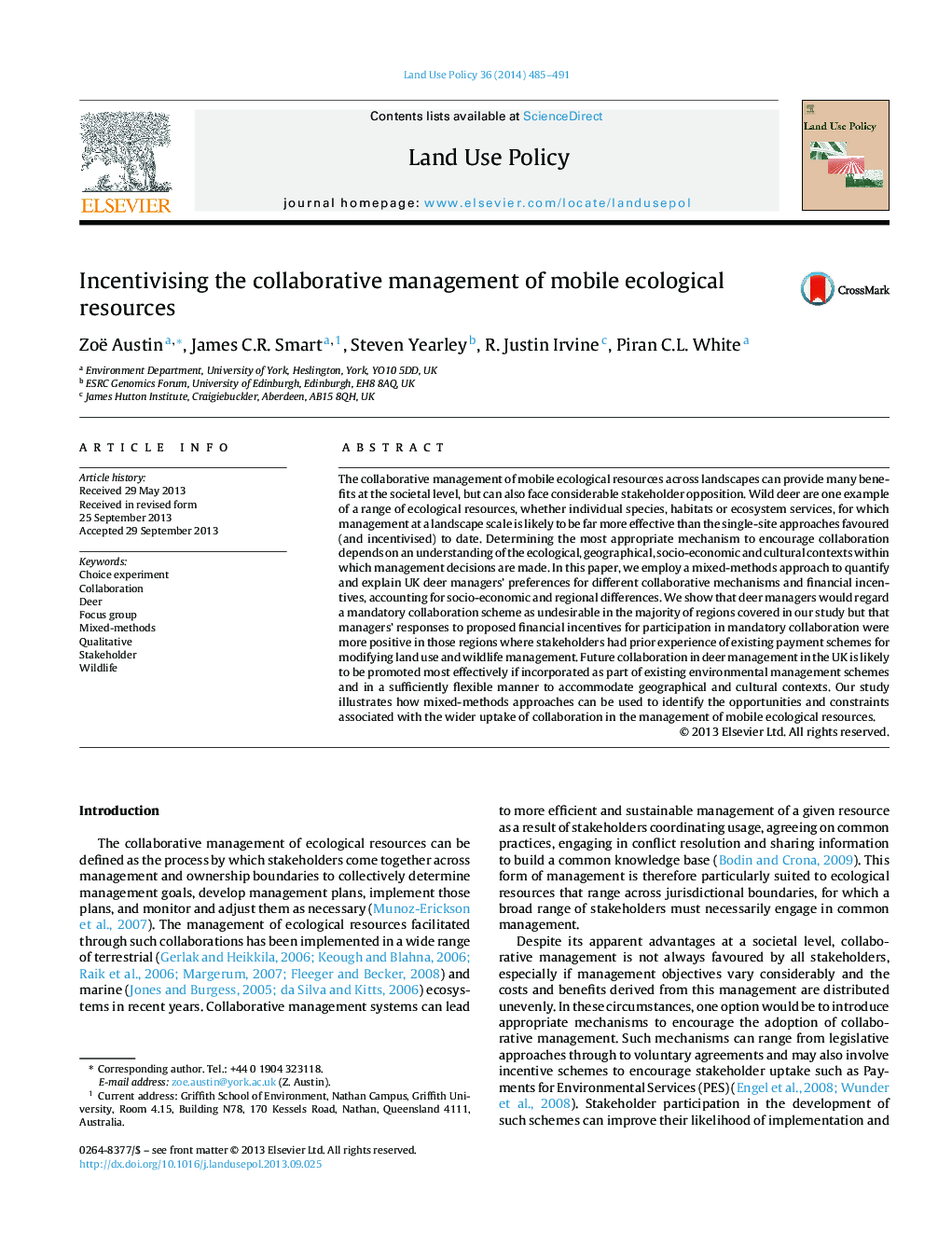| کد مقاله | کد نشریه | سال انتشار | مقاله انگلیسی | نسخه تمام متن |
|---|---|---|---|---|
| 6549024 | 160113 | 2014 | 7 صفحه PDF | دانلود رایگان |
عنوان انگلیسی مقاله ISI
Incentivising the collaborative management of mobile ecological resources
ترجمه فارسی عنوان
ترویج مدیریت مشارکتی منابع زیست محیطی تلفن همراه
دانلود مقاله + سفارش ترجمه
دانلود مقاله ISI انگلیسی
رایگان برای ایرانیان
کلمات کلیدی
آزمایش انتخاب همکاری، گوزن، گروه تمرکز، متفرقه کیفی ذینفع، حیات وحش،
ترجمه چکیده
مدیریت مشترک منابع زیست محیطی تلفن همراه در سراسر منظره می تواند منافع بسیاری در سطح اجتماعی فراهم آورد، اما همچنین می تواند با مخالفت های قابل توجه طرف های ذینفع مواجه شود. گوزن های وحشی نمونه ای از طیف وسیعی از منابع زیست محیطی هستند، از جمله گونه های فردی، زیستگاه ها و یا خدمات اکوسیستم، که مدیریت آن در مقیاس چشم انداز به مراتب موثر تر از رویکردهای تک سایت است که تاکنون به آن علاقه مند شده اند (و انگیزه گرفته اند). تعیین مناسب ترین مکانیسم برای تشویق همکاری بستگی به درک محیط زیست، جغرافیایی، اجتماعی، اقتصادی و محیطی که در آن تصمیم گیری های مدیریتی صورت می گیرد. در این مقاله، رویکرد ترکیبی روش برای تعیین و توضیح ترجیحات مدیران گوزن انگلیس برای مکانیزم های مشارکتی مختلف و مشوق های مالی، با توجه به تفاوت های اجتماعی و اقتصادی و منطقه ای، مورد استفاده قرار می گیریم. ما نشان می دهیم که مدیران گوزن یک طرح مشارکت اجباری را در اکثر مناطق تحت پوشش مطالعه در نظر می گیرند اما پاسخ مدیران به مشوق های مالی پیشنهاد شده برای مشارکت در مشارکت اجباری در مناطقی که متقاضیان قبل از پرداخت موجود طرح هایی برای اصلاح استفاده از زمین و مدیریت حیات وحش. همکاری آینده در مدیریت گوزن در انگلستان به احتمال زیاد بیشترین تاثیر را خواهد داشت اگر به عنوان بخشی از طرح های مدیریت زیست محیطی موجود و به اندازه ای انعطاف پذیر برای انطباق با شرایط جغرافیایی و فرهنگی در نظر گرفته شود. مطالعه ما نشان می دهد که چگونگی استفاده از روش های روش های ترکیبی برای شناسایی فرصت ها و محدودیت های مرتبط با استفاده گسترده از همکاری در مدیریت منابع زیست محیطی تلفن همراه می تواند مورد استفاده قرار گیرد.
موضوعات مرتبط
علوم زیستی و بیوفناوری
علوم کشاورزی و بیولوژیک
جنگلداری
چکیده انگلیسی
The collaborative management of mobile ecological resources across landscapes can provide many benefits at the societal level, but can also face considerable stakeholder opposition. Wild deer are one example of a range of ecological resources, whether individual species, habitats or ecosystem services, for which management at a landscape scale is likely to be far more effective than the single-site approaches favoured (and incentivised) to date. Determining the most appropriate mechanism to encourage collaboration depends on an understanding of the ecological, geographical, socio-economic and cultural contexts within which management decisions are made. In this paper, we employ a mixed-methods approach to quantify and explain UK deer managers' preferences for different collaborative mechanisms and financial incentives, accounting for socio-economic and regional differences. We show that deer managers would regard a mandatory collaboration scheme as undesirable in the majority of regions covered in our study but that managers' responses to proposed financial incentives for participation in mandatory collaboration were more positive in those regions where stakeholders had prior experience of existing payment schemes for modifying land use and wildlife management. Future collaboration in deer management in the UK is likely to be promoted most effectively if incorporated as part of existing environmental management schemes and in a sufficiently flexible manner to accommodate geographical and cultural contexts. Our study illustrates how mixed-methods approaches can be used to identify the opportunities and constraints associated with the wider uptake of collaboration in the management of mobile ecological resources.
ناشر
Database: Elsevier - ScienceDirect (ساینس دایرکت)
Journal: Land Use Policy - Volume 36, January 2014, Pages 485-491
Journal: Land Use Policy - Volume 36, January 2014, Pages 485-491
نویسندگان
Zoë Austin, James C.R. Smart, Steven Yearley, R. Justin Irvine, Piran C.L. White,
